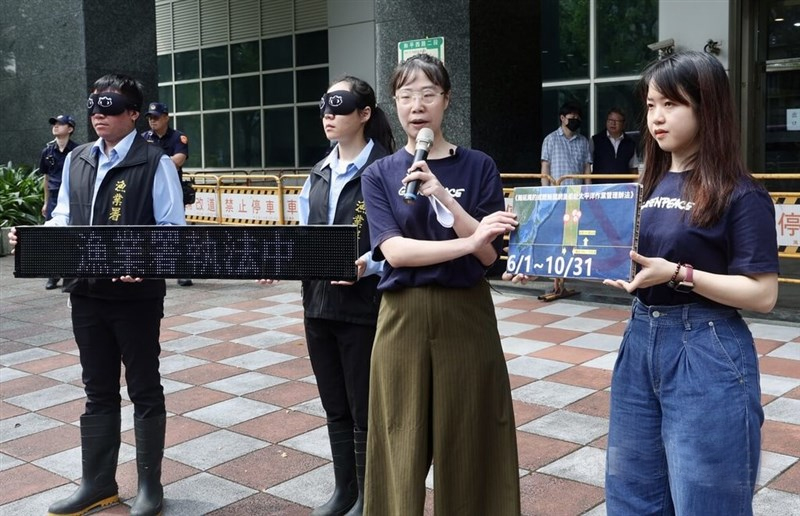Taiwan’s Fisheries Agency has strongly denied accusations made by environmental group Greenpeace that four Taiwan-flagged vessels engaged in illegal shark fishing activities in a closed zone of the North Pacific Ocean in August 2024. The agency clarified that the area in question is not under formal legal restriction but is instead a “voluntary closed zone” for selected vessels conducting trial scientific fishing. This development shines a light on the ongoing global tension between industrial fishing practices and conservation enforcement, raising important questions about transparency, enforcement, and sustainability in the high seas.
Greenpeace’s Accusations: Sharks, Secrecy, and Enforcement Lapses
In a statement released on May 6, Greenpeace claimed that its ship, the Rainbow Warrior, filmed four Taiwan-flagged longline vessels fishing in what it considered a restricted shark conservation area between August 4–10, 2024. The organization said it collected over 10 hours of video footage documenting the capture of at least 39 sharks, including endangered shortfin mako sharks (Isurus oxyrinchus)—a species listed under CITES and whose trade is restricted.
Greenpeace argued the fishing was not incidental bycatch but “planned, targeted behavior,” noting that catch data suggested sharks were the primary focus. The organization accused the Taiwanese Fisheries Agency of failing to enforce its own seasonal shark protections, despite establishing a 24-hour vessel monitoring center (VMC) in 2017.
Fisheries Agency’s Defense: Voluntary Zone, Scientific Trials, and RFMO Guidelines
Responding to the allegations, Lin Ting-jung (林頂榮), Deputy Director of the Fisheries Agency, emphasized that Greenpeace “misunderstood the regulatory framework.” The zone cited is not a formally designated no-fishing zone but rather a voluntary conservation area with limited access granted to selected vessels for the purpose of collecting scientific data.
The agency stated that this policy was introduced in 2021 in response to demands from the fishing industry to lift seasonal shark bans in certain areas. Taiwan’s approach aligns with regional fisheries management organizations (RFMOs) such as the Western and Central Pacific Fisheries Commission (WCPFC), which allows experimental or scientific fishing under controlled conditions.
Importantly, the Fisheries Agency noted that it would only re-evaluate the policy if credible scientific data confirmed the area was a shark nursery or if the WCPFC issued official closures or time-specific bans.
The Conservation Debate: Shark Protections vs. Industry Demands
At the heart of the dispute lies a broader international debate over shark conservation. While Taiwan bans the capture of several species—including whale sharks, basking sharks, megamouth sharks, and great white sharks—enforcement remains inconsistent, according to critics.
Greenpeace pointed to the lack of penalties or fines since 2017 for illegal shark fishing, arguing that the government is “tacitly permitting” unsustainable practices. Marine project director Huang Hsin-yi (黃馨儀) called on Taiwan to implement:
- Systematic inspections of suspected violations
- Public tracking of vessel activity for third-party oversight
- Electronic observer systems, which are becoming a gold standard in global sustainable fishing practices
International Context: Taiwan’s Reputation and RFMO Accountability
This incident comes at a time when Taiwan is trying to position itself as a responsible player in international marine conservation. However, these allegations risk undermining its credibility in global forums.
Observers note that Taiwan has long struggled with IUU (Illegal, Unreported, and Unregulated) fishing designations. Although recent reforms have improved transparency, critics argue that voluntary zones and flexible definitions make enforcement toothless. The dispute with Greenpeace may push Taiwan to tighten regulations and enhance third-party transparency, especially as climate change and overfishing increasingly threaten marine ecosystems.
Expert Insight: Where Policy and Science Clash
While the Fisheries Agency defends its position as science-based and industry-responsive, environmental experts warn that commercial interests may be outpacing conservation goals. Marine biologists point out that shortfin mako sharks mature late and reproduce slowly, making them highly vulnerable to even short-term increases in fishing pressure.
If the area in question serves as a migratory corridor or breeding ground, the long-term ecological costs could far outweigh any short-term commercial gains.
Conclusion
The Taiwan-Greenpeace conflict underscores a growing tension in ocean governance: balancing economic livelihood and marine biodiversity. As global scrutiny on shark conservation intensifies, Taiwan may face increasing pressure to formalize voluntary zones, improve monitoring transparency, and enforce meaningful penalties for violations.
FAQs
Did Taiwan violate any international fishing laws?
According to Taiwan’s Fisheries Agency, no international laws were broken since the area is not legally restricted and falls under a voluntary trial policy. Greenpeace disputes this interpretation.
What species of sharks were allegedly caught?
Greenpeace reported endangered species including shortfin mako sharks were caught. Taiwan bans several species, but not all sharks are covered under strict prohibitions.
What is a voluntary closed zone?
It is an area designated for limited or no fishing access, but without legal enforcement. It’s used for trial or scientific fishing rather than strict conservation.
Has Taiwan penalized vessels for illegal shark fishing?
Greenpeace claims no fines have been issued between 2017 and 2025, despite available monitoring tools.
What changes are Greenpeace demanding?
Transparent vessel tracking, electronic monitoring, systematic inspections, and stricter enforcement of shark protections.


